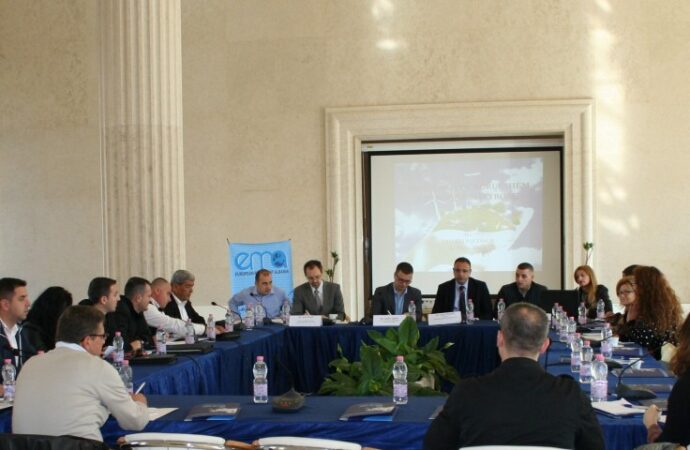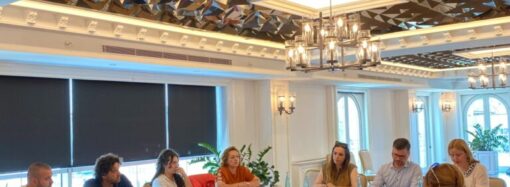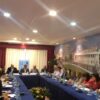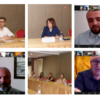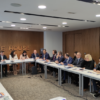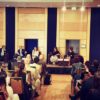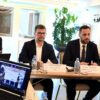On 16 November 2015 in Fier city, European Movement in Albania (EMA) in partnership with Slovak Foreign Policy Association, with the support of the Ministry of Environment, Forestry and Water Administration organized the Session 3 of Working Group IV “Environmental impact of the development of natural resources and the EU policies of sustainable development”.
Mr. Gledis Gjipali, Executive Director of European Movement in Albania explained the reason why it was chosen Fieri this time to conduct the activity in the framework of Convention on European Integration. He mentioned the fact, that Fieri is one of the richest cities with natural resources in Albania, especially with petrol and natural gas, but Mr. Gjipali did not forget to emphasize the environmental damages and pollution caused by the development of natural resources policy, making this city suffering from environmental issues. Petrol and natural gas still remain two most essential resources of our country, in which Patos-Marinza is the largest petrol field in all over the Balkans. According to Mr. Gjipali, there are two important challenges when it comes to the environmental matter, such as the respecting and implementation of laws and also the increase of awareness of the citizens and also to relevant institutions about this topic.
Mr. Agron Basholli, Director of State Inspectorate of Environment in Fier, during his speech assessed as really important the meeting because the environmental problems that they have to face in Fieri are really sharp and complicate their everyday work. Mr. Basholli noted that it is really difficult for his institution to conclude the issues of environment, because of the lack of necessary capacities, such as the tradition on proper treatment and solution of the challenges and also the gap in qualifications and trainings that would help in staff improvement and in better preparation.
During her analysis, Ms. Holta Ymeri, expert of EMA Working Group, gave a clear picture of natural resources situation in Albania and more specifically in Fier, including also the legislation of the production procedure of such sources and in conclusion she analysed the challenges coming from the principle of Sustainable Development and EU regulations. To Ms. Ymeri, despite the fact Albania is very rich on natural resources, the legislation on extraction and processing them is very old, such as: -Law 7746 of year 1993, on Hydro-carbures (Research and Production), which provides some general principles but does not include specific and technical rules on the methodology of research and production, technology usage or environmental protection; -Law 10 304, dated on 15.7.2010, on Mineral Sector in Republic of Albania.
Such laws do not correspond with EU legislation, becoming so a source of a real challenge on the adoption process of a new legislation similar to Europeans directives. The Working Group expert underlined the fact that the methodology of natural resources development is dire in Albania because it does not include three essential pillars of Sustainable Development principle:
1) Economic – The largest part of minerals in Albania are exploited by private companies including Bankers Petrolium in Patos-Marinza and Kuçova areas, while the state sector extracts a small percentage. Secondly, according to the law 7746, state gets only 15% of the petroleum extracted from the private companies, which is a small value comparable to African countries, but not with the European standards.
2) Social – There is a gap on social and health structures set upped for these activities. Furthermore the community near petrol areas or the mine diggers themselves complain about the high risk and life threats coming from such operations.
3) Environmental – Pollution is a huge concern in these vicinities, such as the case of Patos-Marinza area, where petrol is spilled in Gjanica river which further is discharged in Adriatic, damaging the fauna and flora there.
Mr. Juraj Mesik, Energy and Climate Advisor from Slovakia, introduced to the participants the goals and policies to reach a sustainable development and also the challenges Europe and the entire world is facing toady regarding environment and climate change. To him a development of environmental sector is essential, even though this process can be assessed as really expensive, because according to him a future with a polluted environment would cost more. Later on he explained why the natural resources sector remains a real issue in terms of solution, mentioning as a reason the high level of corruption in this field, which requires more effort and cooperation to achieve positive results. Mr. Mesik then was focused on the European Union strategies for environment protection, which could be used and be adopted from Albanian structures in their policies and legislation: 1) Taxation and Subsidies 2) Environmental Impact Assessment based on two EU key directives: Directive 2011/92/EU and Directive 2001/42/EC, known also as Strategic Environmental Assessment 3) 20-20-20 Strategy which has three goals by 2020. EU would decrease by 20% CO2 emissions, also should increase by 20% energy efficiency and increase the use of renewable energy.
In conclusion the members of panel discussed with the participants on the relationship between sustainable development and environment and their effects in the developments of other sectors such as tourism, transportation or the economy. During the debates was noted as important the adoption of a complete legislation and projects or policies in accordance with the EU directives and sustainable development principles.

